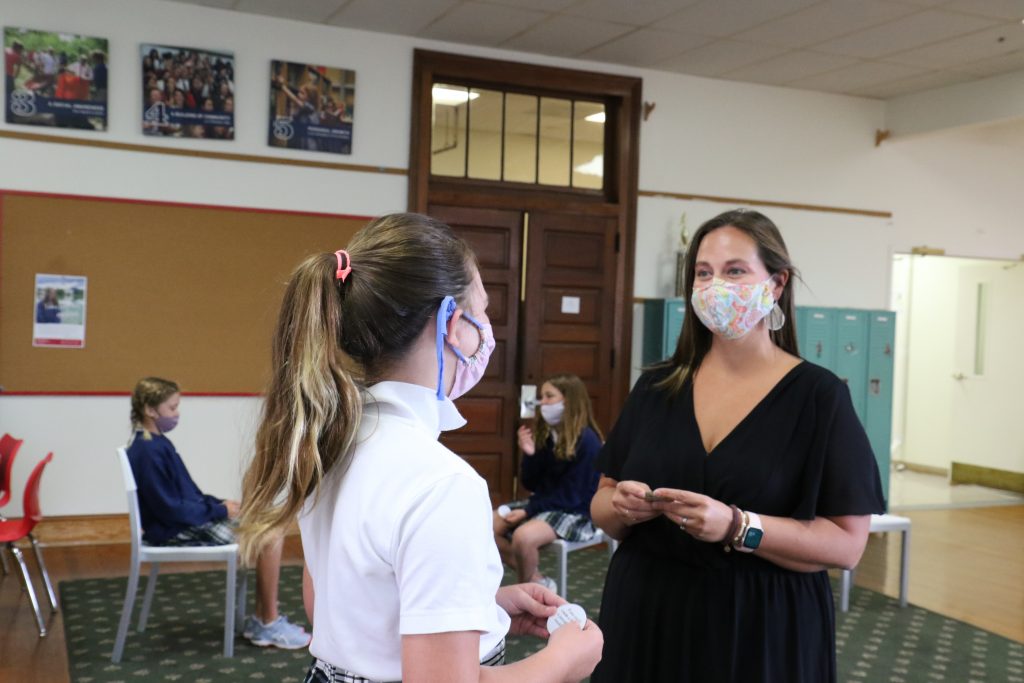October 5, 2020
Dealing with COVID-19 fall-out: Recognizing your child’s social-emotional needs and how to partner with their school for best results.

With the routines and friendships of daily school disrupted this past spring by the COVID-19 pandemic, children of all ages have experienced high stress levels and emotional trauma. From March through September, kids missed being together and were disconnected – from their friends and teachers, summer camp buddies, and extended families. Children’s feelings of loss are still very acute and in some cases are heightened by the death of a loved one.
As a result, social-emotional learning (SEL) is front and center this new school year. In a nutshell, SEL is the process by which we all come to understand and manage our emotions, feel empathy, establish and achieve meaningful goals, and develop and maintain productive relationships. And while SEL concepts may be new to some parents, aware and proactive educators, like those at the Academy of the Sacred Heart, have recognized for decades the importance of SEL in the daily life of their students.
Led by Sacred Heart’s counseling team, teachers take an active role with parents in developing the whole child as an aware and emotionally secure person. This proactive, supportive approach became more pronounced with the long distance learning started in mid-March, as a means of stemming emotional fallout.
We asked the Sacred Heart counseling team for advice to parents on how to meet their child’s social-emotional needs and how schools can support families. The team interviewed were Janice Foulks, Director of Counseling Department and Counselor for Little Hearts, Pre- and Lower-School; Tricia Newton, Middle School Counselor; and, Katye Irwin, Upper School Counselor.
3 Things to Look For: Recognizing Your Child’s SEL Needs

1 – Listen, actively. Ask open-ended questions and listen to what your child chooses to share about their day, how they characterize people and activities, and how they describe their feelings. Although you may be tempted to interrupt with comments or advice, let them lead the conversation without feeling judged.
2 – Note out-of-the-norm behavior. Depending upon your child’s age, it can be difficult to identify what is a cause for concern or just a phase of adjustment. “Make note of the duration, intensity, and frequency of any major behavioral changes,” advises Tricia Newton. “These factors will help you and your child’s teachers and school counselor understand whether this is a blip on the radar or a pattern that may warrant a deeper discussion.”
3 – Recognize a pattern of making excuses. “If you start to notice a pattern of your child not wanting to hang out with their friends or attend social outings they once enjoyed, it is worth a discussion,” says Katye Irwin. “Adolescents are not always known for in-depth conversations with parents. That is why it is so important to be tuned into their normal schedules and social circles. Yet, everyone needs downtime. If your child wants to stay in for a weekend to binge watch, it doesn’t mean something is wrong.”
3 Ways to Best Partner with Your Child’s School
1 – Identify allies at school for your child. Even if there is not an issue, have a conversation early in the school year about the adults at school who can help them if needed. This can be the school counselor, a favorite teacher, the dean of students, coach or band leader. The goal is to ensure that your child has a healthy adult support system who knows your child, makes them feel safe, and can help them through any issue.
2 – Inform the school of any major changes at home. “Your child spends most of her waking hours at school,” said Janice Foulks, “and we want to be prepared to help her. By knowing these variables that may affect her social emotional well-being and behavior, we will be better prepared to care for your child.”
3 – Look for ways to continue relationships. Whether your child is attending physically or virtually, there are multiple new variables that everyone is adjusting to in different ways. Find safe and appropriate ways to help them extend relationships outside of school. This can be FaceTiming with friends, writing letters, or socially distant tailgating. Your child may already enjoy interactive video games to connect with friends; set limits ahead of time and ensure you know the other players.
3 SEL-Building Exercises for Families at Home

1 – Talk about your feelings to build empathy. “Demonstrate the use of ‘I’ statements to help your child practice identifying what they are feeling and understand how others are feeling.” One way to do this is for everyone in your family to share their highs and lows of the day and name their feelings as they describe the high and low.
2 – Share control. In this COVID era, children have little control over so many things. Give your child control over parts of their day and build their sense of decision making by giving choices when possible. Let them select lunchbox items, the movie for family movie night, or a weekend activity.
3 – Give responsibility for personal problem solving. “Give your child the tools to assess and address school issues,” offers Janice Foulks. “One of the things we advise parents to say when a child has a school issue is, ‘I’m so glad you’re telling me this, but I don’t go to your school. Let’s talk about how to get this information to the right person at school so you can get the help that you need.’ Work with your child through this process and give them the responsibility of doing so. Teach them that they are active participants in solving their own problems.”
3 Ways Schools Can Nurture Students’ SEL
1 – Being “present” for students and families. Having visibility with students throughout the day, saying “Hello, I am just checking on things” builds a sense of community and security. With parental school entrance limited now, alternative communications with families are paramount. Our team “meets and greets” at carpool, and we include information in school newsletters and post resources on the school website. All of these strategies say “we are here for you and your family!”
2 – Build the SEL foundation early. At Sacred Heart, the faculty and staff build an SEL foundation from an early age and scaffold that with techniques, including prayer, within a supportive environment. Each student is empowered to find her passion and use her voice with confidence.
For instance, the school’s 4th grade “Smock Patrol” offers a leadership opportunity for older students in Lower School to build community with the youngest students. Every week, a 4th grade group is designated to greet preschoolers as they enter the campus gate and escort them to the building entrance. Every 4th grader takes a turn being a leader and a friend, and the younger students look forward to the opportunity.
3 – Reinforcing the foundation. In the middle and upper divisions, students participate in service learning projects, combining a classroom learning objective with a service opportunity. These projects share a foundation in “design thinking” and require a high degree of social-emotional competencies. Students must be engaged with and sensitive to the situation and needs of others when designing their project.
Parents, Stay Connected!
In all, parents should integrate SEL exercises at home, and ensure that your child is connected to their peers and they have strong supportive relationships with their teachers and school counselors. By being attentive to your child’s behaviors and partnering with their school, you can help them best navigate the challenges of this new normal and nurture their social-emotional and mental wellbeing.
![]() Trevor Wisdom is a New Orleanian and Managing Editor of Nola Family Magazine.
Trevor Wisdom is a New Orleanian and Managing Editor of Nola Family Magazine.


